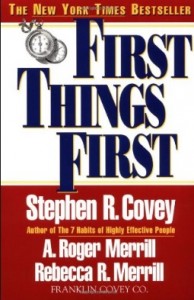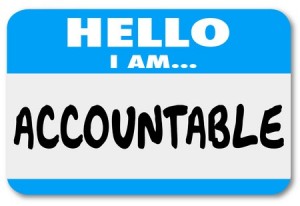The Leadership Challenge with Accountability
The fourth most common value in business is Responsibility, based on my research of Fortune 500 companies. The term most often associated and used as the label for this value is Accountability. (I wonder if corporate lawyers feel it’s ok to say a company is accountable but not responsible. Maybe it has something to do with liability concerns….).
At a personal level, Accountability means being responsible for our own behavior.
In business, Accountability means being responsible for all decisions and actions (behaviors) that span the entire organization. This includes the decisions and actions of every single employee, freelancer, contractor, supplier, etc.
Now that’s a tall order for the leaders of any organization!
How do leaders ensure the decisions and actions of others – whether it’s a few people, or hundreds or even thousands of employees – are aligned and support an organization’s mission, vision, and goals?
This is one of the most difficult parts of leadership.
Learning To Hold Others Accountable
We can learn a lot about this subject from well-known authors Stephen Covey and Patrick Lencioni.
Stephen Covey on Accountability
 In his book First Things First
In his book First Things First, Stephen Covey looks at both sides of accountability: the employee and the organization. Here he asks two important questions:
- To whom are we accountable?
- When will the accountability process take place?
Before answering these questions, Covey says it’s important to establish a Win-Win agreement between every employee and the organization. Each employee needs to know what is expected of them – often referred to as “desired results” – and then how they are being measured. He then goes on to say:
In the process of accountability, the individual evaluates himself or herself against the desired results specified in the agreement.
In other words, accountability is about self-evaluation, providing that employees clearly understand what is expected of them. This is also true of freelancers, contractors, suppliers, etc.
Covey goes on to provide guidance to leaders on how to nurture accountability:
- Build specific criteria into agreements
- Exercise discernment
- Encourage employees to request and be willing to receive feedback from others
Patrick Lencioni on Accountability
 In his book The Advantage
In his book The Advantage, Patrick Lencioni looks at accountability from the role of the leader. In it he writes:
Many leaders who struggle with this (I am one of them) will try to convince themselves that their reluctance is a product of their kindness; they just don’t want to make their employees feel bad. But an honest reassessment of their own motivation will allow them to admit that they are the ones who don’t want to feel bad and that failing to hold someone accountable is ultimately an act of selfishness.
Lencioni highlights that accountability is often confused with conflict because both “involve discomfort and emotion.” He clarifies by stating:
Conflict is about issues and ideas, while accountability is about performance and behavior. As difficult as it is for many people to engage in conflict, at least it is somewhat objective, removed from a person’s behavior. It is much harder for most people to hold one another accountable because it involves something of a personal, behavioral judgment.
Lencioni also talks about different kinds of accountability. Most leaders prefer to focus on performance. The more difficult kind is behavioral, as he clearly articulates:
The reason that behavioral accountability is more important than the quantitative, results-related kind has nothing to do with the fact that it is harder. It is due to the fact that behavioral problems almost always precede – and cause – a downturn in performance and results.
Bottom line: Holding employees accountable for their behavior (which includes all decisions and actions) is uncomfortable and difficult to do for most leaders. Yet it’s an important part of leadership if an organization is to achieve the desired results. The good news is that employees will hold themselves accountable if they clearly understand what is expected of them.
—————————–
What would you recommend for leaders to foster a culture of accountability?









